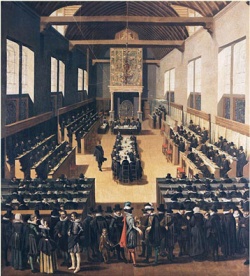The Canons of Dort, Third/Fourth Head of Doctrine, Refutation of Errors, Article Two
 Thursday, May 21, 2009 at 03:38PM
Thursday, May 21, 2009 at 03:38PM 
Synod rejects the errors of those . . .
(II) Who teach that the spiritual gifts or the good dispositions and virtues such as goodness, holiness, and righteousness could not have resided in man's will when he was first created, and therefore could not have been separated from the will at the fall.
For this conflicts with the apostle's description of the image of God in Ephesians 4:24, where he portrays the image in terms of righteousness and holiness, which definitely reside in the will.
_____________________________
As we discussed a bit earlier, this particular error of the Arminians has to do with one’s estimation of the effects of the fall upon the human race. If one believes that the human race suffered great loss in the fall (as do the Reformed) then one must assign a proportionate amount of grace to undo these effects. If the fall brings great damage, grace must repair that damage before people can come to faith in Jesus Christ.
Here, the critical question that must be asked is this: “does the fall bring about damage to essential human nature?” As we have seen, the authors of the Canons are careful to point out that, “yes, mankind suffered the loss of true righteousness, holiness, and knowledge in the fall, that these are part of essential (not accidental, in the sense of being “incidental to) human nature. The loss of them means that after the fall, even though humanity remains human because we retain the image of God, nevertheless, without the supernatural restoration of these essential characteristics through the new birth, men and women cannot come to faith in Christ apart from prior regeneration.
According to Louis Berkhof, all of the Reformers taught that the image of God, “included both natural endowments and those spiritual qualities designated as original righteousness, and holiness. The whole image was vitiated by sin, but only those spiritual qualities were completely lost” (Systematic Theology, 203). This means that sin brought great havoc upon the human race itself, not only in terms of original guilt for Adam’s, but in terms of the corruption of essential human nature. The loss of true righteousness, holiness, and knowledge, are of great consequence.
Although this all sounds quite theoretical, it is Charles Spurgeon who put things into biblical perspective when he said, “he who thinks lightly of sin will think lightly of the Savior.” Since the Reformed see in the fall the alteration of essential human nature, this then requires a supernatural act of God (regeneration and the new birth) to rectify the situation. This is why we must be born again–so that we can be converted at all! If left to ourselves, we would not, indeed we could not, believe the gospel and be saved.
But if true righteousness, knowledge, and holiness, were not part of man’s original constitution at creation, as Arminians and Roman Catholics argue, then man did not lose these in the fall. If these things are not an essential aspect oh human nature, but only incidental to it, restoration of these things are not required in order for people to come to faith in Jesus Christ.
In semi-Pelagian schemes of sin and grace, this restoration occurs as a result of someone coming to faith in Christ. Even though fallen in Adam, men and women supposedly retain the ability come to faith in Christ, since absolutely nothing essential to human nature has been lost as a result of the fall.
Although the “earlier Arminians taught that the image of God consisted only in man’s dominion over the lower creation” (Berkhof, ST, 203) later Arminians rejected the notion of original guilt for Adam’s act, but also questioned the very idea of the original corruption of the human race as well. Arminius’ Adam is wounded, but not corrupted as a result of the fall. Indeed Arminius himself stated, “it is natural and essential to the soul to be a spirit, and to be endowed with the power of understanding and of willing, both according to nature and the mode of liberty. But the knowledge of God, and of things pertaining to eternal salvation, is supernatural and accidental; as are likewise the rectitude and holiness of the will according to that knowledge” (James Arminius, The Works of, II.363). Arminius’ Adam has fallen alright . . . But unlike the Adam found in Scripture, Arminius' Adam can get up!
The best refutation of this notion is that provided by the authors of the Canons. In Ephesians 4:24, Paul speaks of the putting on of the “new self” as one puts on a garment, which, Paul says, is created to be like God in true righteousness and holiness. Likewise in Colossians 3:10, Paul speaks of the fact that we have put on the new self, which is renewed in the knowledge of the image of its creator. The grammatical construction in both passages makes it clear that the new self—that is, the new nature which results from regeneration—includes the putting on of true righteousness, knowledge, and holiness. The fact that these things are renewed, at the very least, indicates that these things were part of humanities’ essential human nature before the Fall.
Although these are lost in Adam, they are restored in Jesus Christ. This is why the Reformed argue that regeneration must precede faith, since it is only as a result of the new birth, that we come to faith and are restored in the image of Christ. Sin has done great damage to all of Adam's fallen race, but the saving grace of God in Jesus Christ inevitably triumphs! “For if, because of one man's trespass, death reigned through that one man, much more will those who receive the abundance of grace and the free gift of righteousness reign in life through the one man Jesus Christ” (Romans 5:17)


Reader Comments